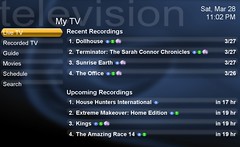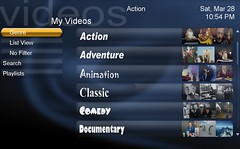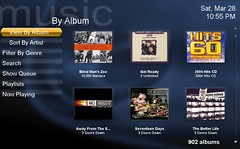I've used a Home Theater PC in my home for many years now and during that time I've spent countless hours on forums, twitter and in person learning about HTPCs and sharing my experience with others. Multiple times I've been asked the following questions about my setup:
- How do you use your HTPC?
- Tell me about your Media Center (HTPC) setup.
- What Tuners do you use?
I've answered those questions piecemeal, but after reading Ben Drawbaugh's post about how he uses windows media center, I thought it would be helpful to share a little more about what makes up the GeekTonic media gadget home. To do that, I'll start with this top-view post about "How I Use My HTPC" and then in future articles, tell you a little more about my setup, the tuners I use and more. In a future segment, I'll also share photos of my setup.
I think there are three different types of Media Center (HTPC) Enthusiasts:
- The Dabbler/Experimenter - Still an enthusiast, but just experimenting with the concept of using a computer to drive media in the home. Usually just one or two TVs are connected and the HTPC is secondary for recording/watching TV, Movies and Music. This is a very generic label, there are many people in this category just learning about HTPCs who might move on to moving their setup more front-and-center to their home.
- The Thrifty Enthusiast - Are you one of those who look at cutting the cable bill, free EPG service and other cost-saving methods? Maybe you're looking at purchasing a cheap computer to handle everything and can see saving money over a few years or less by going with a HTPC? You are the person that falls into this category.
- DIY Custom Installer Enthusiast - If you're in this category, you've come to realize that you want the HTPC to be solid, stable and powerful. A workhorse behind the scenes - to the user it's simple a super-powered, central media server that distributes all of your digital media to TVs around the home. This person thinks more like a professional custom installer, but with a careful eye to ones own personal budget.
I started somewhere between category one and two above, but within a year I had moved on to category three. I'm not in this to save money - if I were I would have a much different setup. More important to me is that the setup is stable and easy to manage while bringing the key functionality I desire.
Home Theater PC Requirements for the GeekTonic Home
During the years I've used a Home Theater PC, the way I use the HTPC has evolved quite a bit. Even with those changes I've followed a few basic rules to keep everyone in the house happy (at least as happy as possible) in regards to the HTPC:
- One remote to rule them all - All media components must be controlled by a single universal remote. And that remote must be easy enough for my family to use it without my help.
- The TV/DVR Must Just Work...Always - When you turn on the TV (yes the family thinks of the HTPC as part of the TV - not a computer), it must work. Any other behavior could cause mild-to-moderate domestic disputes or worse - a cable box rental! Any sign of a BSD (Blue Screen of Death), a Mac, Linux or Windows Menu rearing its ugly head on the TV set is not a good thing during normal use.
- TV/DVR Must Haves Include:
- Smooth and functional fast forward and rewind of all media - Some people are fine with a skip-forward/backward a certain number of seconds to navigate their media. Our family requires smooth fast forward and rewind. Anything less is unacceptable.
- Commercial Skip - One of the things you get with an HTPC that you can't from a cable DVR is commercial skipping. Any show recorded (on my system even live) are marked for commercials so that I can skip them with a simple press of my remote. Much, much better than the 30 second skip many DVRs tout. My wife still to this day calls this feature "SmartSkip" which is a term coined by Snapstream's BeyondTV even though I'm using comskip with my SageTV setup these days. As simple as this function is, it's one of the biggest wow factors that guests notice when watching TV at our home.
- Resume of all media works. Stop a TV show, music or movie and when you start it back up (on any TV in the home) it allows you to resume where you left off or start from the beginning.
- Web-based Guide for remote recording and reviewing upcoming shows. I use this feature pretty often. From work or away from home I can check my upcoming recordings, schedule new recordings and do many other things from a web browser or even my phone. DirecTV has been moving in this direction as well although their use of this has been pretty rudimentary thus far.
- Advanced EPG - Easy to view, customize and search Electronic Programing Guide (EPG). I should note that making the EPG service free (or really pre-paid) is crucial for the long-term value appeal as well.
- Multiple, Expandable Tuners - I count seven tuners currently being used on my HTPC five of which are HD. This means I can record 6 channels and watch another live - or I can record 7 channels at once. Overkill for most times, but nice to have if your a "power user" and I know there are many out there with even more tuners than that.
- Movies & Music should be easily accessible on the HTPC and logically organized so that the user can browse (by genre, date, alpha-sort name, playlist etc) that media and play the movie or music all with that same universal remote control. Unlike many HTPC users, this is the feature set that pulled me into the HTPC world.
- Follow-me functionality is a must. I'm a firm believer that if you're going to invest the time, energy and money in a Home Theater PC, it needs to have a central server that hosts all media including TV. Also that media must be "linked" across the home. Here's what I mean by that: You start watching a TV show (or watching a movie or listening to a music playlist) on one TV in the living room for instance. You should then be able to stop playback on that one TV, go upstairs to the bedroom and turn on the TV there and start that same show (or movie or song) right where you left off when you were viewing from the Living Room. That is the "follow-me" concept that I consider key to the HTPC experience in my home.
- Uniform UI - Any additional HTPC or extender device in the home must have an interface that looks and acts like all others. I started this gig using separate programs driving the TV/DVR functions compared to the other HTPC front-end functions.
That sums up the somewhat steep requirements I have for my Home Theater PC setup. There are many other features that are important to me, but those are the big ones.
How I Use The HTPC
My first motivation to use a HTPC was movies and music - not TV. I had a large collection of CDs and DVDs piled up and wanted a better way of consuming that media. So I began digitizing all of those movies and music until I had quite a bit of media stored on a few hard drives. I really liked having that media accessible via remote control and it wasn't long after when I started with the TV/DVR obsession as well. What I hadn't realized at that time is that the TV/DVR is much more exposed to the rest of the family than the other functions of the HTPC.
Most of the time I could "fix" anything that went wrong with a movie that wouldn't play or a music playlist that didn't work when my wife or daughter tried one of those, but if the TV didn't record a favorite show... I'm in big trouble.
Goodness sakes the wrath of the family is mighty loud! It took all of a few days to realize that this thing had to be rock-solid stable and work all of the time before my family would use it full-time as a supercharged DVR. That is why you see the first two points on the above "requirements" as the most important factors for our HTPC and key to success of the HTPC builder.
Server - My HTPC is driven by a single "server" computer. This means all tuners and the main HTPC software runs on a single computer. A true, multi-room solution means all media is recorded, stored and manipulated on a single computer, but is streamed to extenders and other HTPC computers. Multi-room without a hitch is something elusive to most Cable, Satellite, TiVo and sometimes even Media Center solutions. But I've enjoyed this feature using Meedio, BeyondTV and now SageTV for years.
Remote Control
If you're going to spend the time and money on an HTPC system, you better have a nice, easy-to-use, universal remote control. A device to control the whole setup from the couch.
TV/DVR
If you've ever used a TiVo or even a simple Cable Company DVR, you know how nice it is to be able to time-shift your television. If you want to skip over the commercials, catch every show on a popular night and grab everything in HD, the HTPC just might be your thing. My HTPC has seven tuners, five of which are HD tuners. That means I can record seven shows at once or watch one while six others are recording. No, I don't use all seven tuners all that often, but its nice for those times when I want to. Add to that the HTPC's ability to detect and skip commercials with the press of a remote control even while the show is still recording and you catch my meaning of "superpowered TV". Even though those features are important, stability and reliability is even more important. If the HTPC misses a recording, I'm in trouble and the trust in the HTPC setup drops through the floor - not a good thing.
Some have an HTPC in the house for "special times". In my home, the HTPC IS the Television. Users know no different except for the somewhat different (and more powerful) user interface. Live TV, recorded TV, movies etc all are powered by the HTPC and nothing else.

For my house I have all of those seven tuners running of of a single tuner, but serving up five Televisions in the home. I can start a show in the livingroom, stop it and start back where I left off in the bedroom or the bar/game room or even the shop/lab. Even better, I have my livingroom TV "broadcast" the video/audio signal to the kitchen TV so I can have both the livingroom and kitchen TV viewing the same content simultaneously thanks to a cable modulator pushing that signal to the kitchen.
Movies
My first compelling reason to start with HTPCs was to create a nice, easy, accessible way to archive and access all of my purchased movies from any TV in the house with the remote control.
The HTPC sort of functions like a DIY On-Demand Movie Server without the crazy cable company price.

At the time I had a young daughter who would watch movies over and over (she still does by the way). But those same movies tended to get scratched and even lost over time. I wanted to do away with the physical DVDs and move them to a box in the basement for safekeeping while still being able to browse and view that movie collection from any of our TVs throughout the home. Resume, fast forward, rewind and all the other basic features are included and required in my home.
To make this feature compelling I had to be able to archive those movies once, and add metadata (information and coverart for the movies) to the movies fairly easily so that even with a large movie collection, the end user (my family) could browse, choose and watch a movie all by using a remote control while sitting on the couch. The convenience of browsing a large movie collection by genre, title, release year or date added to the collection made finding and choosing a movie very easy. And the ability to start a movie in one room, and pick up where you left off after pausing a movie from any room in the home was a tremendous feature that was awfully difficult to beat.
Another nice use of the video/movie feature of HTPCs is using it for home movies. We have a lot of home movies that have been digitized an categorized for easy, instant viewing. So when you have a family get-together or a graduation party for your kid, the HTPC comes up strong as a convenient, easy way to view all of those silly, but precious home movies you made of the family moments. I fear that without making these home movies easy to find and view, they would be relegated to a dusty old box to be rarely if ever seen by most.
This is a feature still extremely important to my wife and I as well as my daughter. Beyond the Television/DVR, this is the most popular feature on our HTPC.
Music
As I was digitizing my movie collection years ago, I also began moving my CD and even phonograph music collection to MP3. The same nice features of the movie server were just as nice when it came to my music media. Instant access to my entire music collection including playlists from any room in the home was incredibly nice. I began listening to music differently - by playlist instead of by "album" or "CD" and eventually began taking this same collection portable with MP3 players.
The bottom line is this: All music accessible from a single server all with the same appropriate metadata thanks to my HTPC.

To do this I do have my TV on which is a turnoff for many others - they would prefer a Sonos or Apple Airport Express to drive their music. For me it was a simple thing - I needed to get the most value from the HTPC setup I had invested in so making music work on my HTPC was essential. I do use iTunes and iPods, but my main music collection is from archived music and all hosted on a single HTPC server.
Third-Party Add-Ons
This is another arena where HTPCs can shine over the traditional DVR. Wanting online video streaming, internet radio, weather (actually built-in to most HTPCs), DVD/CD ripping, Home Automation, Creating DVDs or iPod video from your recordings and more? HTPCs can often do many of these things and more.
All Digital Media Across the Home and Everywhere
My HTPC-driven setup started small, with a single multi-use computer hosting movies, music and photos to a single Television set in our home. But it didn't take long for me to want more. Once I had "the bug" I had to leverage that digitized media across the home and even placeshifted over the web. I now have a powerful media server with nearly 5 Terabytes of hard drive storage, three extenders, a HTPC client (softsled extender) and a TV that simulcasts any content from the livingroom TV to the kitchen TV.
The end result has been a very useful Digital-Media-Home driven by a single HTPC server. If your curious about the details of how everything is set up, what hardware and software I'm using and what I plan to do next, stay tuned for the next segment of "Media Gadget Nirvana" at GeekTonic.
